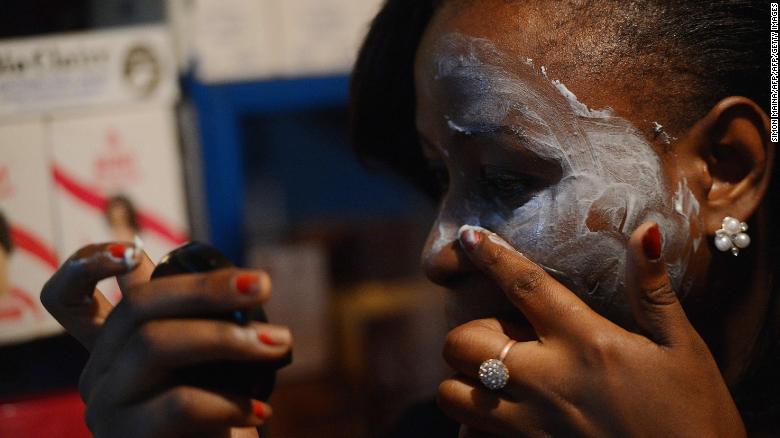
Although safer alternatives exist, many of the bleaching and lightening products used in Africa contain harmful ingredients such as mercury and high-dose steroids.
These ingredients can cause kidney failure and other illnesses, making skin bleaching a public health problem that governments need to address.
According to the World Health Organisation (WHO), 77% of women in Nigeria use skin lightening products, the world’s highest percentage.
However, many healthcare problems in Nigeria and across Africa are not just clinical, they are economical and social.
Banning bleaching products will not completely solve the problem of unsafe skin bleaching unless other measures are also put in place. African women don’t bleach their skin simply because they are vain.
They lighten their skin because fair skin is too often seen as more attractive and provides them with an economic advantage.
Last year, Matthew Knowles, father of singer, Beyoncé Knowles-Carter, one of the world’s most successful entertainers, addressed this issue in a radio interview.
He believes that his daughter is more accepted in the entertainment industry because of her light skin and goes on to point out that “virtually no black popstars with darker skin had broken through in the past decade.”
In his book, Knowles wrote that even his mother disapproved of him having dark-skinned girlfriends.
Edward Ademolu, a PhD researcher at the UK’s University of Manchester, defines colorism as “an intra-racial complexion-based hierarchy that often affords societal, cultural, economic privileges and favouritism towards lighter-skinned people and discrimination against those with darker complexions.”
This is evident in many parts of Africa, where light-skinned women are considered more beautiful and therefore more likely to succeed in some fields, such as in the modelling and movie industries. Even in the corporate world, many Nigerians would agree anecdotally that women with lighter skin are often more successful in securing jobs, particularly in sales and marketing.
There is evidence to support this. In psychology research, it is known as the “the halo effect” — we tend to assume someone has other positive qualities because they possess one; hence the better someone looks, the better a person we think they are.
Shingi Mtero, a lecturer at Rhodes University in South Africa who teaches a course on the politics of skin bleaching, argues in an interview that “in post-colonial Africa, there is still a premium on light skin. Whiteness is something that many Africans aspire to, and light skin still has social capital.”
Mtero argues that many view African women who bleach their skin as vain and irrational.
However, the better job opportunities and elevated status that lighter skin may bring, paint a different picture — a picture of African women making an entirely rational, calculated, business-like decision.
This is the reason I believe banning these products will not completely solve the problem.
We must open up a conversation around skin color and beauty and the media, particularly the fashion media, which must feature other types of beauty beyond the Western ideal, to end this color bias.
It is a major part of tackling what has become a significant public health problem. Without sustained work to change this perception we will only be treating the symptoms, but never actually curing the disease.
By Ola Brown
Ola Brown is a medical doctor and the founder of Flying Doctors Nigeria, a leading air ambulance service in West Africa. A passionate healthcare advocate, Brown works with governments, businesses and charities to tackle healthcare issues on the continent. She is a TED Fellow and a Young Global Leader, as well as the author of three books. She recently published “Fixing Healthcare in Nigeria.”
This article was first published on CNN Africa.










Recent Comments